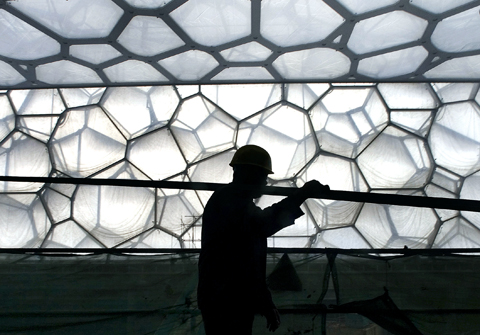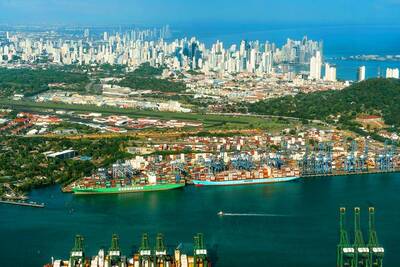The Chinese company that built the “Water Cube” swimming center for the Beijing Olympics said yesterday it hopes to raise up to US$7.3 billion in the world’s biggest initial public offering (IPO) since March last year.
The decision to let China State Construction Engineering Corp (中國建築工程) proceed with such a huge IPO indicates regulators believe China’s markets have regained their strength after a plunge last year that prompted a ban on new offerings.
China’s main market index is up more than 75 percent this year and was the world’s best performer for the first half of this year.

PHOTO: AP
“There will be no problem selling all those shares in the current market mood,” said Mao Nan, an analyst for Oriental Securities in Shanghai.
State Construction will offer 12 billion shares at 3.96 yuan to 4.18 yuan (US$0.57 to US$0.61) per share, the company said in a statement through the Shanghai Stock Exchange. That would bring in 50.1 billion yuan if all shares sell at the highest price.
State Construction said earlier it hoped to raise 42.6 billion yuan. The increase might reflect increased confidence in the price Chinese investors are willing to pay.
State Construction is China’s biggest builder of housing and is known for the “Water Cube” and other showcase projects such as the futuristic state TV headquarters and China’s tallest skyscraper, the 492m-tall Shanghai World Financial Center.
Its IPO would be the world’s biggest since Visa’s US$19.7 billion listing last March, according to financial data firm Dealogic. It would be China’s biggest since PetroChina Ltd in October 2007 and the country’s fourth-largest to date.

LIMITS: While China increases military pressure on Taiwan and expands its use of cognitive warfare, it is unwilling to target tech supply chains, the report said US and Taiwan military officials have warned that the Chinese People’s Liberation Army (PLA) could implement a blockade within “a matter of hours” and need only “minimal conversion time” prior to an attack on Taiwan, a report released on Tuesday by the US Senate’s China Economic and Security Review Commission said. “While there is no indication that China is planning an imminent attack, the United States and its allies and partners can no longer assume that a Taiwan contingency is a distant possibility for which they would have ample time to prepare,” it said. The commission made the comments in its annual

DETERMINATION: Beijing’s actions toward Tokyo have drawn international attention, but would likely bolster regional coordination and defense networks, the report said Japanese Prime Minister Sanae Takaichi’s administration is likely to prioritize security reforms and deterrence in the face of recent “hybrid” threats from China, the National Security Bureau (NSB) said. The bureau made the assessment in a written report to the Legislative Yuan ahead of an oral report and questions-and-answers session at the legislature’s Foreign Affairs and National Defense Committee tomorrow. The key points of Japan’s security reforms would be to reinforce security cooperation with the US, including enhancing defense deployment in the first island chain, pushing forward the integrated command and operations of the Japan Self-Defense Forces and US Forces Japan, as

IN THE NATIONAL INTEREST: Deputy Minister of Foreign Affairs Francois Wu said the strengthening of military facilities would help to maintain security in the Taiwan Strait Japanese Minister of Defense Shinjiro Koizumi, visiting a military base close to Taiwan, said plans to deploy missiles to the post would move forward as tensions smolder between Tokyo and Beijing. “The deployment can help lower the chance of an armed attack on our country,” Koizumi told reporters on Sunday as he wrapped up his first trip to the base on the southern Japanese island of Yonaguni. “The view that it will heighten regional tensions is not accurate.” Former Japanese minister of defense Gen Nakatani in January said that Tokyo wanted to base Type 03 Chu-SAM missiles on Yonaguni, but little progress

IN THE MIDDLE: Some of the lawmakers defended the trip as an opportunity for investment, cooperation and to see models that could help modernize Panama A planned trip by some Panamanian lawmakers to Taiwan has unleashed the latest diplomatic spat with China as the Central American country tries to navigate the turbulent waters between the Asian superpower and the US. The Panamanian Ministry of Foreign Affairs and the US ambassador to the country on Wednesday criticized China’s diplomats in Panama for asking the lawmakers to cancel their trip to Taiwan, with the ministry accusing the Chinese embassy of “meddling” in its internal affairs. That followed comments from Panamanian President Jose Raul Mulino a week earlier saying that the planned Taiwan trip did not have the approval of